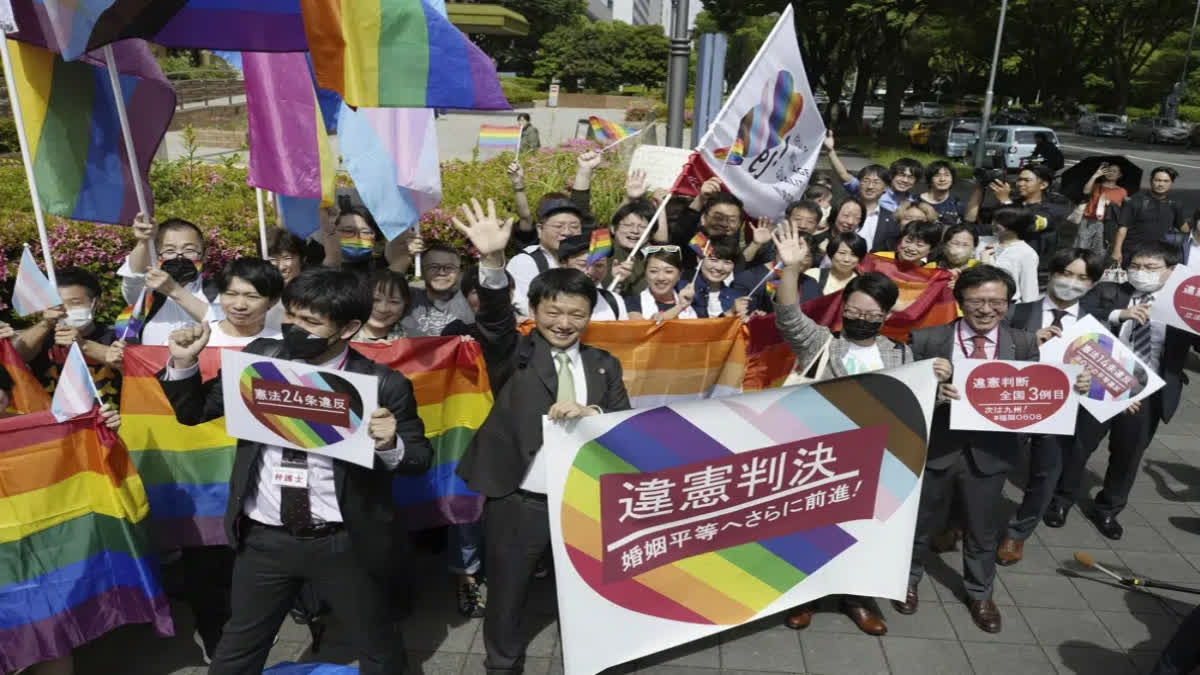Tokyo: A Japanese court ruled Tuesday that the government's policy against same-sex marriage is unconstitutional, in a closely watched decision that supporters say is a step toward marriage equality. The Nagoya District Court in central Japan, however, rejected a request by a male couple that the government pay them 1 million yen ($7,100) each in compensation for the unequal treatment they face because the current system does not recognize them as legally married.
The ruling is the second that found that the government's denial of same-sex marriage violates the constitution, while two other decisions did not. The rulings can be appealed to the Supreme Court. In his ruling, Judge Osamu Nishimura said the current system that excludes same-sex couples with no legal protection for their relationship is unconstitutional and there is no room for government discretion, Kyodo News reported.
Supporters cheered outside the court, waving rainbow flags and holding signs saying, Another step toward marriage equality." Asato Yamada, a lawyer for the plaintiffs, said the court's ruling said clearly that not allowing same-sex marriage violates the guarantee of equal rights under Article 14 of the constitution, and that Article 24 provides freedom to marry by not specifying a prohibition on same-sex marriage.
It's a major step toward achieving marriage equality, he said. The judicial branch, on behalf of the rights of minorities, raised its voice and it will be a strong message to the government, he said. The message is that the government should resolve the problem immediately. Rights activists say Japan's conservative government has stonewalled a push for equal rights that is supported by the general public. Support for LGBTQ+ people in Japan has grown slowly, but recent surveys show a majority of Japanese back legalising same-sex marriage.
Support among the business community has rapidly increased. Japan is the only member of the Group of Seven industrialized countries that does not recognise same-sex marriage or provide other equal rights protections for LGBTQ+ people. Prime Minister Fumio Kishida has said that allowing same-sex marriage would change Japanese society and values and requires careful consideration. He has not clearly expressed his view as conservatives in his party object to legislation forbidding discrimination against LGBTQ+ people. Kishida has said he will listen to various views and watch court decisions on same-sex marriage.
Five lawsuits have been filed across the country since 2019 on marriage equality. Tuesday's decision was the fourth. A March 2021 ruling in Sapporo said the government's rejection of same-sex marriage is unconstitutional, while Tokyo District Court ruled in November 2022 that it is not clearly unconstitutional, but the government lacks a rationale to justify the absence of legal protections for same-sex couples. Osaka District Court said in June 2022 that marriage under the constitution is only for female-male unions and that the same-sex marriage ban is valid.
Chief Cabinet Secretary Hirokazu Matsuno said in response to Tuesday's ruling that cases are still pending and the government will keep watching the decisions. LGBTQ+ activists and their supporters have increased their efforts to achieve an anti-discrimination law since a former Kishida aide said in February that he wouldn't want to live next to LGBTQ+ people and that citizens would flee Japan if same-sex marriage were allowed.
Following widespread outrage over the remarks, Kishida's governing Liberal Democratic Party submitted legislation to parliament to promote awareness of LGBTQ+ rights. The bill, which has not been passed, states that unjust discrimination is unacceptable but doesn't provide a clear ban, apparently in response to the opposition of some conservative lawmakers to transgender rights.
"I hope the ruling will promote awareness among more people about the situation, one of the plaintiffs, whose name was not disclosed due to fear of discrimination, told NHK public television. He called on lawmakers to respond to the ruling by taking action to create a society in which people of different backgrounds can respect and help each other. (AP)



